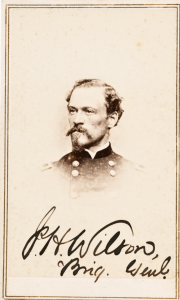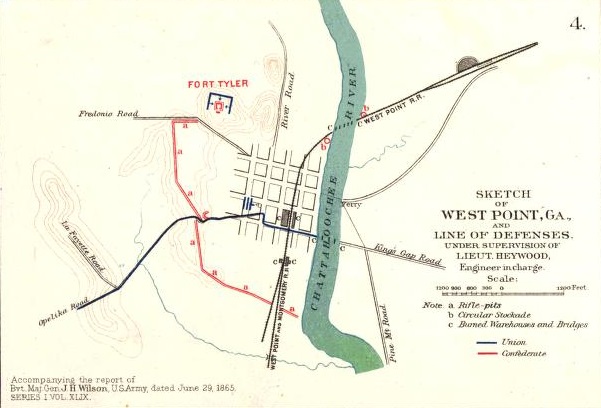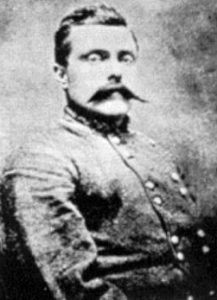Deep South Die Hards vs. James Wilson
1865 saw the Union launch a series of offensives meant to destroy the Confederacy’s last field armies and destroy its remaining industrial infrastructure. Among the offensives was James H. Wilson’s cavalry raid. It was the grandest of the Civil War. Wilson led 13,500 horsemen through Alabama and into Georgia and Florida. His goal was to capture industrial cities and town and defeat Nathan Bedford Forrest. William Tecumseh Sherman told George Thomas, Wilson’s immediate superior, he wanted “Forrest hunted down and killed.” Forrest commanded the largest Confederate cavalry force, some 8,000 men. Forrest’s command though was scattered, and he failed to concentrate his forces.

Forrest fought Wilson as hard as he fought anyone in his long career. When desertion spiked, Forrest had two Kentucky cavalrymen executed and their bodies displayed on the road. He battled Wilson at Ebenezer Church and Selma despite being out-numbered. In both battles he personally killed Union troopers. Richard Taylor, Forrest’s immediate superior, wrote “Forrest fought as if the world depended on his arm.”
Forrest was Wilson’s most famous opponent but not his only adversary. After taking Montgomery, Wilson turned to Georgia. He attacked in two columns, headed for West Point and Columbus.
West Point was defended by a small garrison commanded by Robert C. Tyler. He was a hardcore secessionist and Southern nationalist. At Shiloh he reformed the 15th Tennessee by brandishing a pistol and threatening to shoot anyone who ran away. He lost three horses at Shiloh and was wounded. He then lost a leg at Missionary Ridge. Tyler had three cannon and 265 men at Fort Tyler. The fort had to be stormed, and both Tyler and his second in command, Celestino Gonzales, were killed. Tyler was the last general to die in the Civil War. Although hardly a grand battle, it was a fierce enough fight, and at one point the Confederates even threw rocks.

An even bigger battle occurred at Columbus, where Georgia state troops and militia were posted. In a swirling fight, the town was seized. As the fighting came to a close, Charles Augustus Lafayette Lamar died leading a last ditch charge. Lamar was the last Confederate officer to die in battle. Like Tyler, he too was a hardcore secessionist. He openly advocated opening the slave trade.
After the Union victory at Columbus, Macon fell without a fight and Jefferson Davis was captured by elements of 1st Wisconsin and 4th Michigan Cavalry. Forrest meanwhile reformed his command. On April 25, he told his men to stand firm. Thomas meanwhile made it clear that Forrest would be branded an outlaw. He also threatened to ruin Mississippi and Alabama so “that they will not recover in fifty years” if Forrest did not give up. The day before Davis was caught, Taylor surrendered. Forrest was at Gainesville with his command and informed them that the war was over.
The final act of Wilson’s raid came in Florida. John Milton, Florida’s hard-core secessionist governor, declared to the Florida legislature that the North had developed “a character so odious that death would be preferable to reunion with them.” Milton was seemingly as good as his word, and on April 1 he shot himself. George Washington Scott surrendered all troops in Florida on May 13 and on May 20 Tallahassee was occupied.
The raid was a stunning success. Wilson’s men captured Davis and five fortified cities. They took 288 cannon and 6,820 prisoners. In all, Wilson lost at most 800 men.
In his memoirs, Ulysses S. Grant was unkind to Wilson’s raid, bemoaning that it was “without any good result. Indeed much valuable property was destroyed and many lives lost at a time when we would have liked to spare them. The war was practically over before their victories were gained.” Yet, no one could know exactly when the war would end and Grant was the one who ordered the raid. More importantly, Wilson’s raid showed that however out-matched, there was a cadre of hard-core Confederates willing to fight to the bitter end.

On the raid Wilson met stubborn resistance. Forrest fought Wilson in two battles and executed deserters. Both Tyler and Lamar died fighting in hopeless battles. Milton chose suicide over submission. Some of Forrest’s men wanted to keep fighting and asked him to go west but he refused, even as they wept, yelled, and destroyed their flags. Forrest told his men: “Civil war, such as you have just passed through, naturally engenders feelings of animosity, hatred and revenge. It is our duty to divest ourselves of all such feelings…You have been good soldiers; you can be good citizens. Obey the laws, preserve your honor, and the government to which you have surrendered can afford to be and will be magnanimous.” It was a tall order, considering that the North’s victory assured the end of slavery and the end of the South’s political prominence. The economic devastation wrought by men such as Wilson added another layer to the bitterness. Given the realities of Gilded Age corruption and political partisanship, the South could expect little in the way of economic relief in the coming years. The uneven experiment in racial equality led to a deadly political contest that would end up defining Southern politics even after the last Confederate veteran died.

Forrest did not take his own advice. He joined the Ku Klux Klan and for a time fought a guerrilla war against the government. Davis was never tried and never renounced his actions. Other lesser Rebels fought on. Six Confederate diehards lived in caves near Mobile and did not surrender until 1866. Most former Confederates did choose peace and reconciliation, but not enough to avoid a perilous and violent Reconstruction.
When an invading army commits war crimes against, not just, opposing soldiers but the civilian population as well, to many, it would be a little hard to forgive and forget. It took the South over a hundred years to recover and yet, they are still the poorest part of the nation. In a way, people today are still waging war against their culture, history and heritage.
For too many reasons to count, they should be.
Robert, did you just get done watching Gone with the Wind and feel a little nostalgic for the “good ole days?” Let me respectfully remind you that those southern states seceded from the United States and then proceeded to initiate a military conflict against the United States Government. I don’t have much sympathy for these traitors. Men like Forrest were very lucky they weren’t hanged after the war.
Most historians agree that Sherman’s March and Wilson’s Raid shortened the duration of the war by a year or more and prevented additional human suffering and casualties on both sides. Let us be thankful for the end of the war when it came. Let us also be mindful that it would take another 100 years to guarantee basic civil rights for all Americans, which were promised in the 14th and 15th Amendments.
Interesting article; thanks for posting.
The problem with some historians is they fail to look at the whole picture, from the revolutionary war to the war for southern Independence. Our founding fathers wisely gave us a Constitution and Bill of Rights that would put restrictions on the Federal government and left the real powers to the states and their people. Several states refused to sign onto the original compact until they received assurances that should their people decide it was no longer in their best interest to remain in that compact, they could leave.
What many historians fail to do when writing on the war is to ignore the unconstitutional acts of the Federal government and the northern states which led to the war. President Buchanan, before leaving office, even stated that the Federal government had no constitutional authority to wage war on any state. As for anyone being a traitor, let’s start with Lincoln, who stated, I’m not going to let some piece of paper, the Constitution, to keep him from holding the union together. None of the Southerners were charged with treason because to do so would put the whole illegality of the war before the Supreme Court.
Robert:
Here’s “the whole picture:” Thank God the North won. Slavery was abolished, and our beloved United States of America remained the United States of America.
Nicely said.
We will let Robert live in his fantasy world thinking that a CSA victory would have been a positive development in American history. For all intents and purposes, the CSA existed with impunity from 1877 through 1965 and didn’t exactly flourish as a society.
There are a two books of interest: Yankee Blitzkrieg and Wilson’s Raid (both on Amazon). I have been a student of the raid for many years…being from Alabama originally. I have BGen (US Vol.) Eli Long’s copy of Jomini’s The Art of War. Inscribed by him at Gravelly Springs, AL, dated Feb. 2d 1865. He was one of Wison’s subordinate commanders leading the 2d Div. and was seriously wounded at Selma. Gravelly Springs was from where they launched the raid.
You are lucky to own that book inscribed by Eli Long, one of the great unsung US cavalry commanders from the war. He was wounded numerous times and retired from the regular army soon after the war and lived a quiet life in New Jersey. Where did you get it?
I love my country but do not ignore the fact that she has many sins, especially the genocide of the native Americans and slavery. The northern states had slavery as well. Millions of dollars were made by the shipping industry bringing the slaves here. Slavery would have passed without 800,000 Americans being killed and uprooted.
It seems that there are those here that do not believe that their government should be held accountable to violating the Constitution or Bill of Rights….which will lead to tyranny. Both countries, the USA and CSA, would have survived a peaceful separation, and even thrived, while upholding the values and laws our founding fathers gave this nation.
No government is perfect, but the Confederacy was probably the worst idea and was founded on flawed principles. Read Confederate Vice President Alexander Stevens’s Cornerstone Speech.
President Lincoln–who never recognized secession–had every right to put down the rebellion and restore the Union. Lincoln gave his life for that cause, as did hundreds of thousands of US soldiers. And we should be thankful for that.
Robert:
I agree with you to a certain extent. After winning the CW, the North should have allowed South Carolina to remain a separate country. The USA would be far better off today without SC. Come to think of it, we would be better off without Mississippi and Alabama, too.
But what about James Petigru’s famous line when South Carolina was having its secession convention: “South Carolina is too small for a republic and too large for an insane asylum?” If so does that apply to both Mississippi and Alabama as well?
If pigs had wings, they could fly
And here I thought nothing interesting happened in Florida, haha.
I enjoy reading content that gives a somewhat more balanced view of characters and actions taken during the war. Up until recently, I was under the impression that Forest was this fantastic general that should be put on a pedestal next to Stonewall or something. I’m slowly learning that everyone has their flaws and aren’t “golden boys” as the Lost Cause doctrine suggests. Thanks for the post 🙂
My reading of Southern history before the Civil War is of a desperately poor general white population for the most part. The War, Sherman, etc. didn’t create the situation. Nor did reconstruction help.
I’m with Mr. Rainey on this one. Had the South won the war, everything would have been different, but the Constitution would have been upheld. Many Union Officers, starting with Grant, would have been court-martialed for mismanaging a war against an under manned and under supplied upstart country. Lincoln would have still been alive, but impeached by a team of “angry rivals”. When you win, lots of things get swept under the rug.
I find it hard to be thankful for the war and its results. Not because I favor the Confederacy, but because such things were decided through blood and suffering, leaving scars that have still not healed. The Lost Cause and Just Cause have always tried to make the war something more holy but they can never quite get away from the harsh reality that a republic was thorn apart and slaughtered itself. The genesis of that destruction was in the American Revolution, in both the failure to end slavery and the tradition of separation and rebellion at the slightest excuse.
Well said 🙂
I understand Lincoln’s desire to forgive,the South, but can’t for the life of me understand Lee’s reasoning, could he not see the “traitorousness (sp) of Southern secession?!
There is nothing traitorus about a people of each State, meeting in convention and democratically voting to form their own country. The US has supported many Democratic separatist movements in other countries around the world. There were many throughout the US that correctly believed that the Federal government lacked the Constitutional authority to wage war on any state. President Buchanan reaffirmed this belief before leaving office.
There is no provision in The United States Constitution for an admitted state to withdraw from the union. One might base withdrawal on the Tenth Amendment, but that is a significant stretch. The United States was not truly melded as one nation until on or about the time of the Spanish-American War. Previous to that, and especially during the run-up to and the waging of the Civil War, individual loyalties were first-most to their respective state and secondarily to the nation. Lincoln firmly took the position that one or more individual states could not secede, leading to armed conflict. The seceding states were largely led by wealthy planters and other citizens whose wealth would eventually be destroyed if the institution of human (black) bondage was totally abolished. The initial seeds of this egregious institution began when the first slave transport ship arrived at Point Comfort, VA in 1619, not far from Jamestown. My forebear British Army Surgeon John Woodson purchased one or more slaves from this ship. (Frank and Jesse Woodson James of Missouri infamy are also Dr. John Woodson descendants.) When secession fever developed in the South, Governor Sam Houston of Texas strongly opposed Texas secession, but he was deposed when the state voters approved secession by a much less-than-overwhelming margin. Houston warned that secession would ultimately bring ruin, and he was prophetically correct.